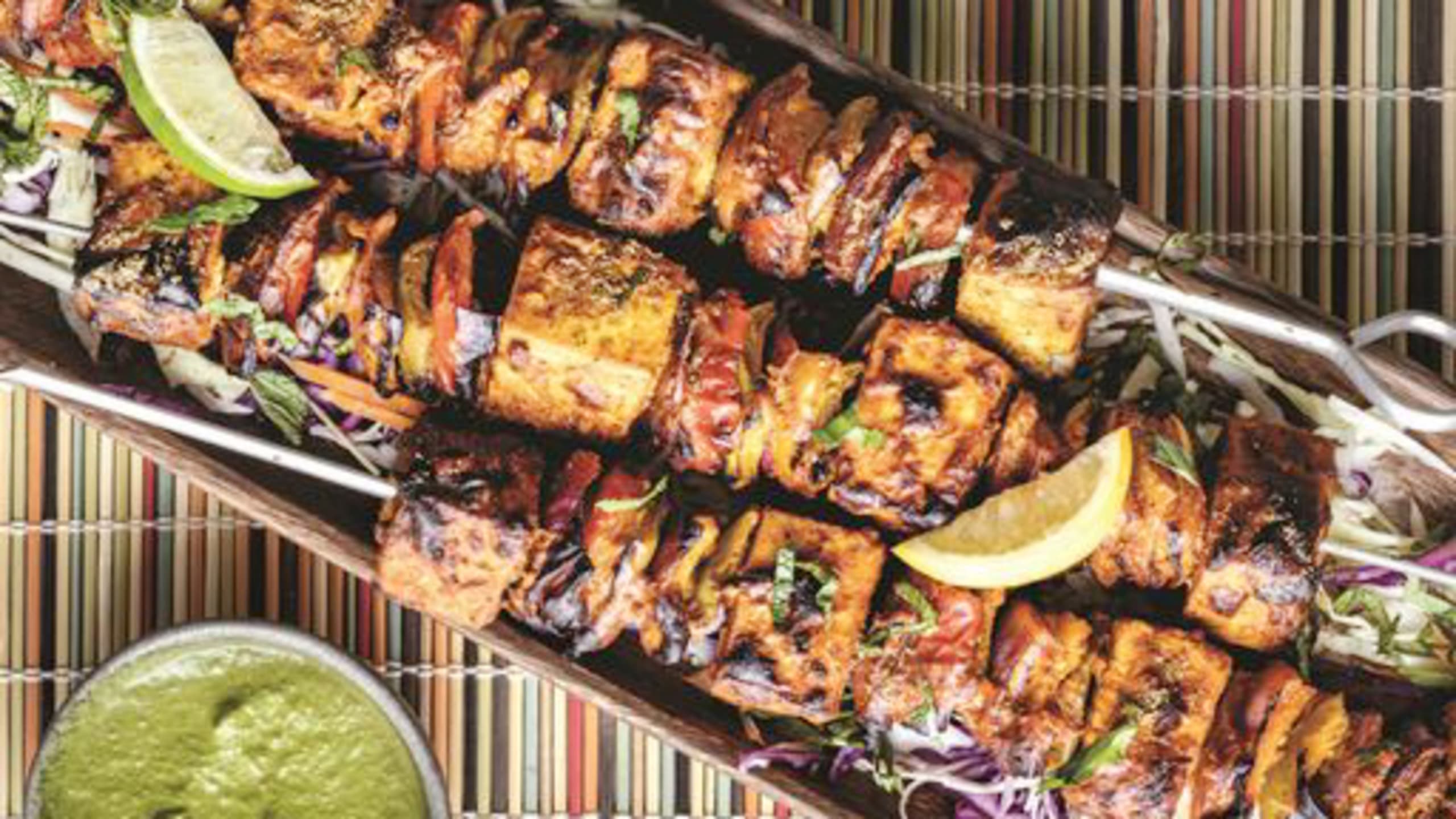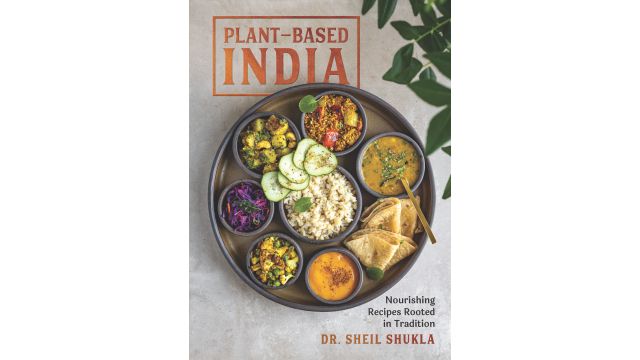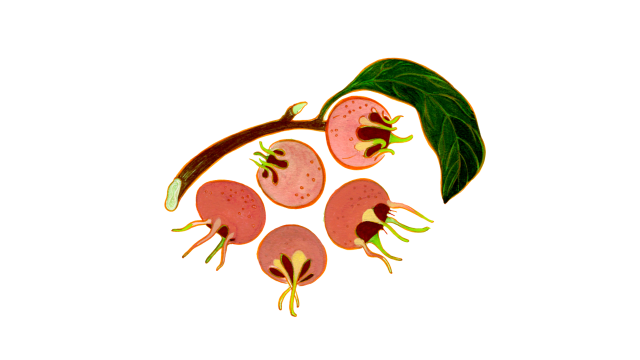Q&A with Dr. Sheil Shukla

Can art double as a language of nutrition? Chicago-based Dr. Sheil Shukla certainly thinks so. He has put an arty spin on the growing population of doctors on social media discussing health and nutrition. He uses his Instagram account to showcase plant food art and photography as a plant-based food artist. He also develops vegetarian and vegan recipes and shares delicious images of nutritious food that he makes at home as a way to wellness.
His first cookbook, Plant-Based India: Nourishing Recipes Rooted in Tradition is a delectable collection of vegetarian and vegan recipes that exemplify traditional culinary wisdom inherent in Indian cooking and nourishing ingredients with a contemporary approach to nutrition and wellness.
Shukla says it is vital that we factor nutrition as preventive medicine. He informs his patients about the benefits of plant-based nutrition and wholesome food practices that are our first line of defense against diseases and many health conditions.
Born and raised in Milwaukee, the child of immigrant parents from Gujarat, a northwestern state in India, Shukla grew up eating vegetarian food, made from scratch at home by his mother and Ba, his grandmom. Caving under peer pressure to taste pizza and donuts in the land of plenty, Shukla turned to home cooking during his undergrad days while living away from home studying fine art, design and visual communication alongside molecular biology and pre-med coursework. As a student Shukla often craved the comfort of food he had grown up eating at home. He found himself drawn to the culinary heritage of his family and soon said goodbye to dorm food and worked to become a better cook.
Shukla soon found himself deep-diving into culinary therapies and nutrition. He found tradition-based culinary wisdom equally fascinating as modern nutrition and cooking practices that help in managing diabetes and heart health. He earned a certification in Plant Based Nutrition from Cornell University and has made it an important feature in his medical practice.
Going through his beautifully produced book that has earned a James Beard Awards nomination, it’s easy to understand that including nutrition as part of his medical therapies is a wonderful way Shukla has found to bring his love of art, food, and medicine together.
Roundglass Food: What was your impetus to study plant-based nutrition alongside your medical education?
Dr Sheil Shukla: In medical school, I learned that the first-line treatment for many chronic illnesses such as high blood pressure and high cholesterol involves lifestyle changes through diet and exercise. However, there was not much emphasis on what this should fully entail. I attended conferences on nutrition in medicine and sought further education to learn more about the practical aspects about how to counsel patients on diet, with plant-based nutrition at the forefront.
RG: How will awareness about culinary medicine help in cooking and eating better?
SS: By acknowledging the importance of how food nourishes us, I believe more resources will be devoted to incorporating nutrition into preventive medicine and treatment plans. The emergence of culinary medicine over the past few years has already started to change more recent medical school curricula to include more on nutrition, which has been particularly exciting to see.
RG: As a busy physician of internal medicine how often do you find talking to your patients about nutrition, especially plant-based foods?
SS: I find it fairly easy to spend at least a couple minutes during a visit to highlight the importance of nutrition as it ties into overall wellbeing. It’s also quite easy to share additional resources such as websites and books to get the conversation going. Then during subsequent visits, we just pick up where we left off.
RG: What’s your main nutrition concern, and how do you address it?
SS: One of my main concerns regarding nutrition is that many individuals simply do not consume enough fruits, vegetables, whole grains, legumes, nuts, and seeds — foods that have abundant evidence supporting their healthful impacts. I work toward addressing this by simply bringing attention to it, offering resources, and leading by example.
RG: You call yourself a plant-based artist. What are the mindful aspects of art that you find reflected in cooking and healthy eating?
SS: Cooking after a long day at work is, for me, a way to unwind and enjoy the process of creating a meal. I find the journey as much joyful as the meal in the end.

Tofu tikka (Pic courtesy: Plant-Based India)
RG: What salient nourishing aspects you would like the world to know about Gujarati cuisine?
SS: What I appreciated about Gujarati cuisine and about Indian cuisine in general while in India was the importance of cooking in season. The seasonal produce there made for some of the best and most nourishing meals cooked at home.
RG: What is your enduring food memory while growing up, especially around your Ba?
SS: I so enjoyed seeing my Ba’s creativity shine when she dabbled with other world cuisines and incorporated local produce not traditionally used in Indian cuisine to make the most of what was available to her when living in the US.
RG: What are the ingredients in the Indian pantry you recommend adding to our meals for nutrition and wellness?
SS: I think two classes of ingredients are best used in abundance: spices — antioxidant powerhouses — and lentils, rich in fiber and minerals.
RG: If you could invite anyone over for dinner, who would you call and what dish/dishes would you serve them from your book Plant-based Nutrition?
SS: I’d love to invite the longstanding friends I’ve made through Instagram from around the world. I’d make an elaborate thali (plate) filled with at least one dish from each chapter of my book.
RG: Is there any ingredient/food group you would demand to be eliminated and why?
SS: Ultra-processed foods! I’ll clarify that not all processed foods are bad by default, but ultra-processed foods such as those containing trans fats are some of the most harmful foods and are best avoided.
Key Takeaways
- Dr. Sheil Shukla on culinary health.
- Explore nutrition and wellness via vegetarian recipes.
- Discover Gujarati plant-based nutrition.






